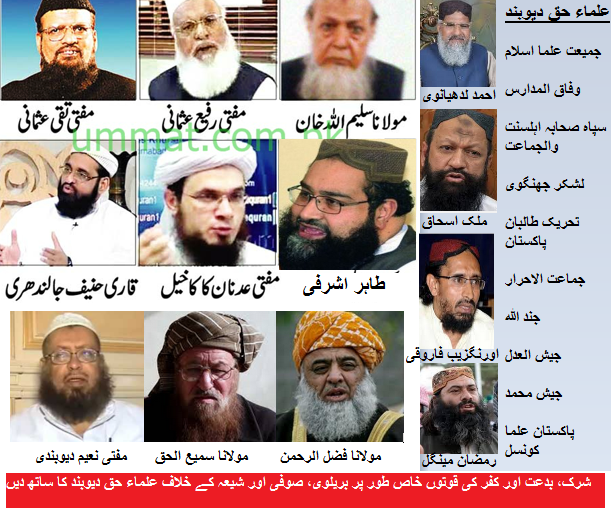Media Discourse on Deobandi Terrorism – May 12 to May 25, 2015
Why Afghan Women Carried a Funeral Casket for the First Time in Memory
Extreme fundamentalist mullahs have threatened the moderate Sufi inclinations of Afghans for a century. In 1929, King Amanullah banned ultraconservative clerics of the Indian Deobandi school from the country, denouncing them as “bad and evil persons” who spread foreign propaganda. But the modernizing king, an early proponent of women’s rights, was forced to abdicate and the ultraconservative mullahs came back. (Currently, the Taliban’s leader, Mullah Omar, though not fully qualified as a mullah, is Afghanistan’s most famous Deobandi.)
Source:
http://www.thenation.com/article/207025/why-afghan-women-carried-funeral-casket-first-time-memory
Anti-Ismaili attack spotlights Pakistan’s intensifying sectarian violence
13.05.2015
Over the past several years, conflicts between the Islamic Republic’s Sunni Deobandi and Shiite Muslim groups have increased in brutality, frequency and mortality. Shiites make up around 20 percent of the country’s predominantly Muslim population.
Experts say the latest round of sectarian violence in the country is merely a continuation of the targeting of Shiite Muslims by various militant groups such as Lashkar-e-Jhangvi and the Tehreek-e Taliban Pakistan, who are mainly from the Wahhabi sub-sect known as the Deobandis.
“It’s therefore important that we identify this as not a Sunni-Shiite conflict, but a conflict between Sunni Deobandi and Shiite Muslims – with Shiite civilians bearing the brunt of the violence,” said Arif Rafiq, Pakistan expert and president of Vizier Consulting, which provides strategic guidance on Middle East and South Asian political and security issues.
They call on provincial and local officials to enforce existing laws that empower them to curb hate speech and incitement, and limit the movement of individuals on terrorist watch lists. The political leadership at the federal and provincial levels also has to bring radical Sunni Deobandi and Shiite leaders together, getting them to agree to a code of conduct, said analyst Rafiq.
Source:
http://www.dw.de/anti-ismaili-attack-spotlights-pakistans-intensifying-sectarian-violence/a-18448126
Karachi Bloodbath
Ali Salman Alvi
May 20, 2015
The Nation
If the state has any intent to make inroads into terrorist organizations, a concentrated effort is imperative to acknowledge, scrutinize and debunk the tenets of the ideology that provides terrorists with a framework for action, motivation and justification of their ruthless acts. There are no two ways about the fact that the most virulent terrorist groups operating in Pakistan are inspired by the fundamentalist Deoband brand of Islam. Be it the Taliban, Tehreek-e-Taliban Pakistan, Lashkar-e-Jhangvi, Sipah-e-Sahaba or Jundullah, all these groups share the same sectarian beliefs, source their members from Deobandi madrassas and have the same ideological goals. Time and again these groups have, claimed responsibility for carrying out attacks on the Shia community, denounced the victims as “infidels”, and made it very clear that they were engaged in a “war of belief” with Shias – adding that attacks against them would continue until Shias, in their millions, were wiped out of Pakistan. Blaming India’s spy agency RAW for each and every terrorist attack can be a good choice for an ostrich-like response but it is definitely not going to combat the religious extremism that is gripping our society like never before.
On one side Shias are being wilfully massacred for practicing a faith that is disapproved by the radical Deobandis and on the other side the misleading and malicious propaganda, that not only Shias, everyone is being targeted, obfuscates the systematic killing of the members of Shia community. There is enough hate material available online and offline against Shias, that declares them infidel and thus liable to be killed. It does not take a rocket scientist to figure out that who is peddling this hate campaign against Shias in particular and other minorities in general.
Source:
http://nation.com.pk/columns/20-May-2015/karachi-bloodbath
Against binaries: a conversation with Mohsin Hamid
Abbas Zaidi
22 May 2015
Source:
https://theconversation.com/against-binaries-a-conversation-with-mohsin-hamid-41958
Understanding the new militants of Pakistan
Dawn
While the Punjabi Taliban emerged from Deobandi and Salafi militant groups, the Jundullah groups are breakaway factions of the Jamaat-e-Islami (JI) and its student and militant wings.
Source:
http://www.dawn.com/news/1183341
A simple but tough question
May 24, 2015
The News on Sunday
If an analytical gaze is fixed on the Sunni characterisation of the narrative, one may discover its Deobandi direction. The mention of Mujadid Alif Sani, Shah Walliullah Dehlvi and Shabbir Ahmed Usmani, as the architects of the ideology that underpins state nationalism, testifies to the overwhelming sway of Deobandi ideas in Pakistan. Similarly, historical events, such as the Faraizi Movement in Bengal, Jihad Tehreek or more importantly the Khilafat Movement, ostensibly have no bearing on the way the Pakistan Movement evolved and subsequently culminated in the state of Pakistan. It can also be argued that Khilafat Movement essentially was a Deobandi project, disapproved by the founder of Pakistan.
Source:
http://tns.thenews.com.pk/a-simple-but-tough-question-about-pakistan-national-narrative/


Saudi Money is being used to Kill Muslims by the hands of Muslims like:
Taliban, LeJ, ISIS, Al-Qaeda
But to save Muslim, Saudia does not Donate a Single Rial:
http://s6.postimg.org/e01kli68h/Myanmar_Rohingya.gif